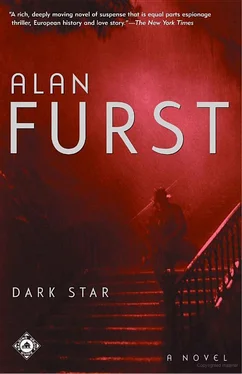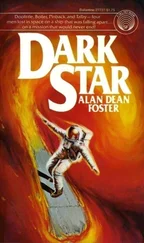Alan Furst - Dark Star
Здесь есть возможность читать онлайн «Alan Furst - Dark Star» весь текст электронной книги совершенно бесплатно (целиком полную версию без сокращений). В некоторых случаях можно слушать аудио, скачать через торрент в формате fb2 и присутствует краткое содержание. Жанр: Шпионский детектив, на английском языке. Описание произведения, (предисловие) а так же отзывы посетителей доступны на портале библиотеки ЛибКат.
- Название:Dark Star
- Автор:
- Жанр:
- Год:неизвестен
- ISBN:нет данных
- Рейтинг книги:3 / 5. Голосов: 1
-
Избранное:Добавить в избранное
- Отзывы:
-
Ваша оценка:
- 60
- 1
- 2
- 3
- 4
- 5
Dark Star: краткое содержание, описание и аннотация
Предлагаем к чтению аннотацию, описание, краткое содержание или предисловие (зависит от того, что написал сам автор книги «Dark Star»). Если вы не нашли необходимую информацию о книге — напишите в комментариях, мы постараемся отыскать её.
Dark Star — читать онлайн бесплатно полную книгу (весь текст) целиком
Ниже представлен текст книги, разбитый по страницам. Система сохранения места последней прочитанной страницы, позволяет с удобством читать онлайн бесплатно книгу «Dark Star», без необходимости каждый раз заново искать на чём Вы остановились. Поставьте закладку, и сможете в любой момент перейти на страницу, на которой закончили чтение.
Интервал:
Закладка:
“Herr Szara.” Von Polanyi’s feelings were clearly hurt. “Please try to think better of me than that. We have a friend in the SD who is, covertly, a friend of the NKVD. With your permission, we are going to have you leave this troubled world tonight, one of the many who did not survive Gestapo interrogation. You may, if all goes smoothly, read your own obituary should the Russians choose to proceed in that way. But you must not betray us, must not spring alive with your name at the foot of a newspaper column. Can you give me your word that it will be so-forever? “
“You have my word,” Szara said. “But it cannot be that simple.”
“Auf!” Von Polanyi said in despair. “Of course it isn’t. Nothing is. You will live in mortal fear of chance recognition. But I do believe that a certain inertia will help to keep you safe. A Soviet officer will think a long time before insisting that an enemy declared dead by the NKVD is in fact still with us. To discredit the leadership of his own organization is something he will not do easily. Better to convince himself that he’s seen a ghost, and that Moscow remains infallible.”
“They’ll want proof.”
“The proof is that they’ve discovered the event by clandestine means, and that when a feeler is extended at some remote level- ‘Seen our man Szara anywhere?’-we’ll deny we ever heard of you. Then they’ll believe it. The real danger to you is gossip-a group of emigres, for example, chattering about a Russian-speaking Frenchman who sneaks off to eat blini when he thinks no one’s looking. You have a French passport, according to the Gestapo teletype. They describe it as ‘valid.’ Use it. Be that Frenchman. But you must alter your appearance as best you can and live the life of a Frenchman-a Frenchman who best not return to France, a Jew from Marseille, mixed up in who knows what unsavory affair. Grow yourself a vulgar little mustache, grease your hair, gain weight. You won’t fool the French; they’ll know you’re a fraud the minute you speak a word. But with luck they’ll take you for nothing more than a creature of the gutter-just not their gutter. Put it about that you lived in Cairo and sold the wrong stocks to the chief of police. There is a bustling world at the margins of society; I’m sure you know it. It hides all sorts of people, it may possibly hide you. Well, what do you think? “
Szara didn’t answer right away. He stared at his hands and finally said, “Maybe.”
“The best deception is the one we ourselves believe in, and that is always the sort of deception that saves our lives,” Von Polanyi said, a bit of the philosopher’s gleam in his eye. “Survive, Herr Szara. I think it’s your gift in this life. Trust in the fact that most people are never very sure of themselves-‘Oh but you do remind me of him,’ they’ll say. You must, however, become the legend you create for yourself, and you may not take vacations from it. For you, perhaps a little job of some sort might make all the difference-something not quite legitimate.”
Szara turned and looked out the window, but nothing had changed; a starless night, the steady rhythm of rain in a forest. Finally he said, “How would we communicate?”
Von Polanyi let the silence rest for a moment; it meant they had reached an understanding, the sort that does not require words. Then he went through the procedures: a postal card to a certain drapery shop, a poste restante return address, then contact. His tone was casual, almost dismissive, implying it was the sort of thing that Szara had done a thousand times before. When he’d finished, Szara said, “And if I simply vanish? “
“We are equals in this affair,” Von Polanyi said easily. “If you don’t want us, Herr Szara, then we don’t want you. It’s just that simple.”
They took him out of Germany in grand style, in a dark green Mercedes driven by a young man barely out of his teens, a naval officer, pink-cheeked, gangling, and endlessly solicitous. Every hour or so he would pull over, wait until the road was clear, then knock delicately on the lid of the trunk and whisper loudly, “All is well?” or some such thing.
All was well enough. Szara lay on a saddle blanket, his valise beside him, surrounded by assorted tack that smelled richly of old leather and horse. They had fed him sumptuously at the inn, a tray left in front of the door bearing poached eggs and buttered bread and jam tarts. And the naval officer-somewhere outside Vienna, he guessed-slipped him half a cold roast duck in a napkin and a bottle of beer. In the horsey-smelling darkness Szara felt a little seasick from the curves but picked at it for form’s sake and drank the beer. There were three stops. Each time he imagined papers being presented to the accompaniment of Hitler salutes and a rough joke and a laugh. By nightfall they were rumbling up the avenues of a city and Szara was let out on a dark street in a pleasant neighborhood. “Welcome to Budapest,” said the young officer. “The stamp is already in your passport. Good luck.” Then he drove away.
He was, in some sense, free.
Jean Bonotte was abroad in the world and lived much as Von Polanyi had suggested he might-in shabby hotels near railroad stations or in the narrow streets by the harbor, where the air smelled like dead fish and diesel oil. He stayed nowhere very long. Joined a restless army of lost souls, men and women without countries, not so very different from his days in Kovno. He stood with them on the long lines for registration at the police stations-“One more week, sir, then out you go”-ate at the same cheap restaurants, sat with them in the parks when the pale winter sun lit up the statue of the national hero. He changed. The cracked mirrors in the numberless hotel rooms told the story. He did not, as Von Polanyi had suggested, gain weight. He lost it, his face lean and haunted beneath his awkward, refugee haircut. He grew a natty mustache and trimmed it to perfection, the last vestige of self-respect in a world that had taken everything else away. A pair of faintly tinted eyeglasses gave him the look of a man who would be sinister if he dared, a weak, frightened man making a miserable pretense of strength. This message was not lost on the predators. Again and again the police of various cities took the little money he had in his pocket, and on two occasions he was beaten up.
The second day in Budapest, when he hadn’t quite got the hang of life in the alleys, a little fellow with a cap down over his eyes and a stub of cigarette stuck to his lip demanded money for entry into a certain neighborhood-or so Szara guessed from his gestures, for he understood not a word of Hungarian. Szara angrily brushed the impeding hand away and the next thing he knew he’d been hit harder than ever before in his life. He barely saw it happen, this dog didn’t growl before it bit. Szara simply found himself lying in the street, ears ringing, blood running in his mouth, as he fumbled for money to offer. Fortunately he’d left his valise in a hotel or it would have been gone forever. The damage, when he saw it, was horrific. Both lips had been split to one side of his mouth, as well as the skin above and below. It healed poorly. A dark red scar remained. In his mismatched jacket and trousers, wearing a shirt bought purposely a size too large so that it stood out around his neck, he already looked like a man whose luck, if he ever had any, had run out a long time ago. The scar drew the eye, confirmed the image. If the NKVD was still hunting for Andre Szara, and he had to assume that they might be, they wouldn’t look for him hiding inside this sad, battered fellow.
Budapest. Belgrade. The Romanian port of Constanta. Salonika, where he sold lottery tickets in the streets of the large, prosperous Jewish community. Athens. Istanbul. The new year of 1940 he welcomed in Sofia, staring at a light bulb on a cord that dangled from the ceiling and thinking of Nadia Tscherova.
Читать дальшеИнтервал:
Закладка:
Похожие книги на «Dark Star»
Представляем Вашему вниманию похожие книги на «Dark Star» списком для выбора. Мы отобрали схожую по названию и смыслу литературу в надежде предоставить читателям больше вариантов отыскать новые, интересные, ещё непрочитанные произведения.
Обсуждение, отзывы о книге «Dark Star» и просто собственные мнения читателей. Оставьте ваши комментарии, напишите, что Вы думаете о произведении, его смысле или главных героях. Укажите что конкретно понравилось, а что нет, и почему Вы так считаете.












